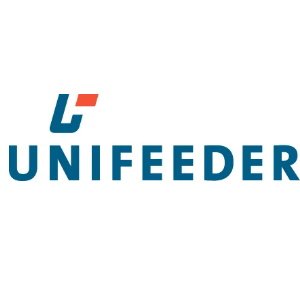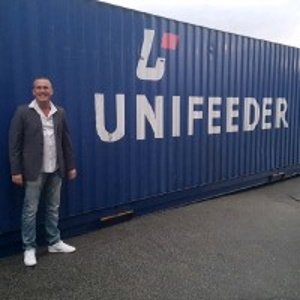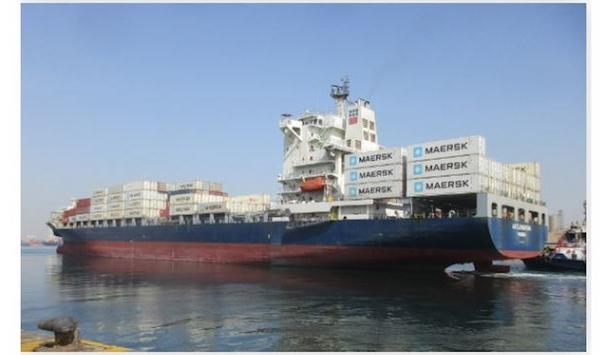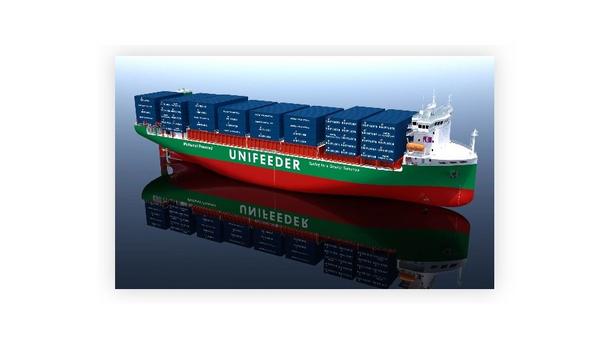Unifeeder - Experts & Thought Leaders
Latest Unifeeder news & announcements
Unifeeder A/S and MPC Container Ships ASA (MPC) announced a new strategic collaboration to make joint investments into Energy Efficiency Technology (EET). The partnership will see the parties unite to increase decarbonisation and efficiency in maritime transport, driving forward Unifeeder’s own target to cut its emissions by 47% by 2030 and support customers to accelerate their Scope 3 reductions. Advanced EET solutions Unifeeder and MPC will jointly invest in efficiency-enhancing retrofits with advanced EET solutions Under the agreement, Unifeeder and MPC will jointly invest in efficiency-enhancing retrofits with advanced EET solutions. The investments will be shared between the charterer, Unifeeder, and MPC. Subsequent cost savings resulting from these energy efficiency enhancements will also be shared between the two parties, fostering a mutually beneficial relationship, lowering fuel costs for the charterer and increasing the value of the asset for the owner. A key aspect of this collaboration is the involvement of a trusted independent third party, Vessel Performance Solutions ApS (VPS), which will monitor on all the installation of technical solutions to measure the efficiency savings from the installed EET using real-time data. Partnership with MPC Container Ships Unifeeder's Director Group Decarbonisation, Christian Hoepfner, commented, "We are excited to embark on this innovative partnership with MPC Container Ships. At Unifeeder, minimising fuel consumption and enhancing operational efficiency is a priority." Christian Hoepfner adds, "This collaboration not only aligns with our goals for decarbonisation but also sets a precedent for the industry to overcome traditional split incentive barriers. By jointly investing in a bundle of Energy Efficiency Technologies and sharing the resulting benefits, we are paving the way for a more sustainable future in maritime transport." MPC’s joint investments Unifeeder and MPC’s joint investments will focus on several solutions Unifeeder and MPC’s joint investments will focus on several solutions including the installation of variable frequency drives to adjust the outputs of high-consumption parts to suit the specific need at the specific moment and a filtration system to purify lubeoil. All together, these are expected to cut emissions by over 10%. Philipp Niesing, Managing Director at MPC, expressed enthusiasm about the partnership, stating, "This agreement with Unifeeder is a testament to our commitment to collaborative decarbonisation and efficiency enhancements. Investments in our existing fleet is a cornerstone of our USD 400 million fleet renewal investment program as this will immediately contribute to reducing emissions. By overcoming the traditional split incentive structure, we hope to drive positive change in the industry, and we are proud to partner with Unifeeder in this undertaking." Efficiency-enhancing modifications This new initiative joins several other Unifeeder sustainability schemes, which focus on increasing fuel efficiency, optimising vessel operations and replacing older vessels with methanol-powered ships that are due to enter operation by 2026. Unifeeder is also making a series of different efficiency-enhancing modifications and technologies in its chartered fleet of ships, including silicone coating, optimisation of power consumers, and increased use of biofuels. Unifeeder - part of DP World’s Marine Services Division Unifeeder is part of DP World’s Marine Services Division and plays a key role in advancing DP World’s 'Our World, Our Future' sustainability strategy. Broader division-wide initiatives, of which Unifeeder plays a decisive part, include the Zero Emission Port Alliance (ZEPA) which is led in partnership with APM Terminals and is an industry-wide strategic coalition to accelerate the journey to zero emissions for container handling equipment (CHE) on ports.
From June 1, Unifeeder will offer its customers ‘GreenBox’, a new carbon insetting solution to decarbonise the seaborne sections of their supply chains. The service is an important element in Unifeeder’s wide-reaching sustainability strategy, which aims to cut the business’ emissions by 47% by 2030 and enable customers to accelerate their Scope 3 reductions. GreenBox Unifeeder Group, a key part of DP World’s Marine Services Division, is already running part of its global services using alternative fuels. GreenBox tracks these shipments and generates tokens for each ton of carbon saved. Customers can purchase the tokens, or ‘insets’, for use in their sustainability reporting and Unifeeder uses the proceeds to buy more alternative fuels. The first tokens have already been successfully generated and can be acquired. CO2 emission reduction Renewable fuels based on green hydrogen and advanced biofuels could cut up to 80% of CO2 emissions The International Renewable Energy Agency (IRENA) estimates that renewable fuels based on green hydrogen and advanced biofuels could cut up to 80% of CO2 emissions attributed to international maritime shipping by mid-century.Unifeeder’s Chief Commercial Officer, Martin Gaard Christiansen, commented, “We are experiencing increasing demand for solutions to reduce emissions within our customers' supply chains. The use of our GreenBox application supports a decarbonisation cycle that expands the use of alternative fuels and accelerates the decarbonisation process of our industry.” Clean Cargo Initiative GreenBox follows the guidelines of the globally recognised Smart Freight Center and its Clean Cargo Initiative and each carbon inset is verified by Bureau Veritas. Customers will be able to easily acquire their insets by using dedicated online access, which will allow them to manage and track their insets. Unifeeder plans to generate around 25,000 tokens in the introductory phase of GreenBox in 2024. Use new alternative sources Unifeeder’s Director of Group Decarbonisation, Christian Hoepfner, stated, “It will be many years before we achieve regulatory-driven price parity between conventional fuels plus their CO2 surcharges and alternative fuels." "GreenBox will accelerate the industry’s ability to utilise more alternative fuels and crucially support us to use new alternative sources beyond biofuels, such as ammonia and methanol.” Sustainability initiatives GreenBox and the use of alternative fuels are just one of Unifeeder’s sustainability initiatives, which also focus on reducing fuel consumption through measures to increase fuel efficiency and optimise vessel operations. Unifeeder has also started to replace some of its older vessels with methanol-powered ships, due to enter operation by 2026, and expects to cut 15,000 tCO2 emissions annually per vessel. It is also pressing ahead with the implementation of various efficiency-enhancing and fuel consumption-reducing modifications and technologies in its chartered fleet of ships.
Unifeeder Group has completed a long-term charter agreement for two additional methanol-capable container feeder vessels. This follows the agreement for two initial vessels announced in October 2023, underscoring the group’s commitment to greener shipping solutions. 1250 twenty-foot TEU vessels The latest agreement is in partnership with German-based ship-owning group Elbdeich Reederei and Norwegian shipowner MPC Container Ships (MPCC), who are responsible for one vessel each. The 1250 twenty-foot equivalent unit (TEU) vessels, scheduled for delivery in 2026, will be deployed on Unifeeder’s European network. The addition of these new vessels reinforces the group’s ongoing efforts to reduce emissions across its network. Fuel efficiency Unifeeder collaborates with industry partners to address the challenge of renewable methanol supply Simultaneously, Unifeeder is enhancing fuel efficiency throughout the fleet while increasing the utilisation of biofuels in its conventional vessels. In alignment with its parent company, DP World, Unifeeder collaborates with industry partners to address the challenge of renewable methanol supply. This requires off-take commitments to establish production at the scale needed to replace conventional fossil fuels within the industry. Methanol-powered vessels Jesper Kristensen, Group CEO of Unifeeder Group, said, “Building upon our commitment to methanol-powered vessels last year, this marks another significant stride towards the green transformation of our fleet and operations." "We anticipate the vessels to enter into operation in the next two years, advancing our steadfast commitment to sustainable solutions. We offer our customers alternatives that align with their sustainability journeys while making meaningful progress towards our own ambitious decarbonisation goals.” Decarbonisation plan Unifeeder has committed to a 25 percent reduction of emissions by 2030 and to reach net zero by 2050 The investment in the two new additional ships further supports Unifeeder Group’s ambitious decarbonisation plan. Surpassing the industry average, Unifeeder has committed to a 25 percent reduction of emissions by 2030 and to reach net zero by 2050 with no new fossil greenhouse gas emissions. It aims to achieve this by emphasising fuel-efficient practices, regular maintenance and refitting processes of the existing fleet, and fostering a culture of learning and collaboration, sharing best practices across markets to drive effective carbon reduction strategies. Reducing carbon footprint Unifeeder Group is part of DP World Marine Services, which announced in December 2023 that it had reduced its carbon footprint by more than 16% in 2023 from its 2019 baseline of 2,118 ktCO2e by creating efficiencies across its operations. DP World also joined the First Movers Coalition, setting a target for 5% of its marine power to come from zero-emissions fuels by 2030, marking its commitment to decarbonisation – a sentiment echoed by the Unifeeder Group.


















